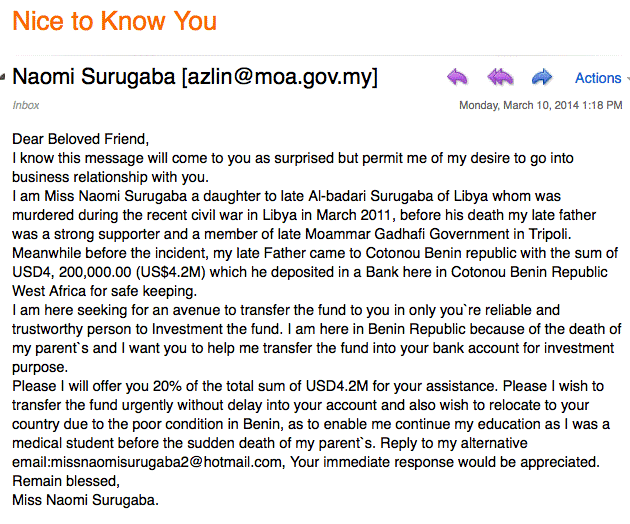Email and internet scams are becoming more widespread and continue to plague individuals and businesses alike. Most scams attempt to trick the recipient into disclosing personal or high-level account information to be used with malicious intent. These are phishing scams.
Other scams include clickbait links that download malware onto the user’s computer, allowing the scammer direct access to all user data. Scams like these can cause a lot of damage and are difficult to deal with.
Having the ability to recognize email and internet scams is the first step in avoiding them altogether.
Nigerian Email Scam
Phishing is one way that hackers deceive individuals into sharing personal information. One of the most common phishing examples comes from the Nigerian Investment Scam. In fact, it is highly likely that we have all received an email from a Nigerian prince wanting to generously share his wealth.
The Nigerian email scam is one of the longest-running and most widely recognized forms of internet fraud. Using this technique, scammers offer you a large investment opportunity. All they ask for in return is bank account information to transfer the money.
Now for many, this is an obvious scam that can be ignored without a second glance. However, for others, greed takes over and they give in to the temptation of the offer. In 2018, Americans lost over $700,000 to this scam alone.
Here is an example of the Nigerian Email Scam:

What to look for
Phishing scams can be difficult to recognize, but here are a few things to ask yourself before reading an email.
Is this coming from a legitimate source?
Check the “To” and “From” fields.
Is the email listed in the “From” field associated with the email content? For instance, if the body of the email is from your bank but the email address is non-sensical, you should delete the email immediately.
Does the author address you by name, or do they use a generic greeting?
It is unlikely for a legitimate source to address you with a generic greeting, like the Nigerian Scam example above: “Dear Beloved Friend”.
If you don’t know the sender, consider ignoring the email.
Does the email make sense?
Bad grammar and/or spelling errors can be a strong indication that the author may not be a native English speaker and may be using a translation service to draft the message.
Does the email sound scary, or too good to be true?
Phishing emails might try to make you think someone opened an account under your name, ask you to confirm personal information, or show you a fake invoice and ask you to click on a link to make a payment. These are various ways that scammers will try to trick you into clicking a risky link to give them access to your personal information.
On the other hand, phishing emails might also try to coax you to click on a link by offering you a voucher for free stuff or telling you you’re the heir to a large sum of money – don’t be fooled by this!
Phishing emails can appear to come from your bank, your favorite social media platform, or even your favorite movie binging website.
Luckily, you can protect yourself from being the victim of a phishing attack by relying on common sense. Don’t assume that an email is authentic at first glance. Be on the lookout for warning signs before you click on a link and provide any personal information. Better yet, when in doubt – delete the email.
For additional tips, read our earlier blog “Five Ways to Avoid the Threat of Email Phishing.”

written by
Kelley Foyle
February 4, 2020
Stay informed with industry-relevant emails curated by our team of experts.
We send out emails once or twice a month relating to IP Services, industry news, and events we'll be attending so you can meet our experts in person.

Kelley Foyle
Kelley Foyle is an eager Fraud Specialist with an affinity for true crime podcasts. She recently earned her Master's degree in Criminology and Justice Studies with a concentration in Victimology from Kent State University. Her thesis focused on wrongful convictions and the systemic failures of our criminal justice system. When she's not searching for new fraud patterns, Kelley can be found crafting, spending time outside, or binging the latest Netflix series.



